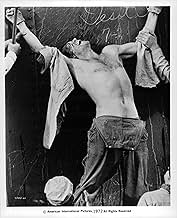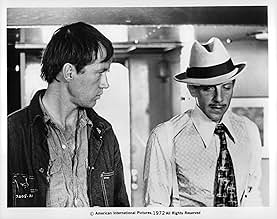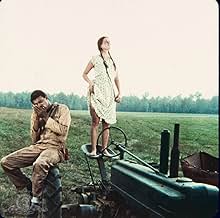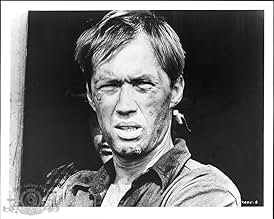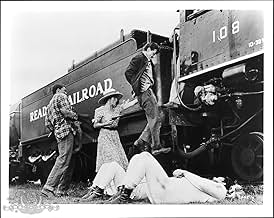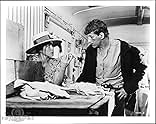IMDb रेटिंग
6.0/10
12 हज़ार
आपकी रेटिंग
अपनी भाषा में प्लॉट जोड़ेंDuring the Great Depression, a union leader and a young woman become criminals to exact revenge on the management of a railroad.During the Great Depression, a union leader and a young woman become criminals to exact revenge on the management of a railroad.During the Great Depression, a union leader and a young woman become criminals to exact revenge on the management of a railroad.
- निर्देशक
- लेखक
- स्टार
- पुरस्कार
- कुल 1 नामांकन
David Osterhout
- McIver #2
- (as David R. Osterhout)
Grahame Pratt
- Emeric Pressburger
- (सिर्फ़ क्रेडिट)
'Chicken' Holleman
- M. Powell
- (सिर्फ़ क्रेडिट)
Harry Northup
- Harvey Hall
- (as Harry Northrup)
Jerry Cortez
- Sheriff
- (बिना क्रेडिट के)
Louie Elias
- Boxcar Tough
- (बिना क्रेडिट के)
Michael Fitzgerald
- Apple Peeler
- (बिना क्रेडिट के)
Gerald Raines
- Train Engineer
- (बिना क्रेडिट के)
Gayne Rescher
- Brothel Client
- (बिना क्रेडिट के)
फ़ीचर्ड समीक्षाएं
Boxcar Bertha is an early Scorcese, made just on the eve of his highly personal breakthrough film Mean Streets. In other words, these were the days before he could call the shots and was merely a jobbing director. It's a cheap exploitation flick, and like most B-pictures it's a cash-in knock-off of a recent hit movie in this case Bonnie and Clyde. It crams in all the essential ingredients for the genre hold-ups, union men, pinkertons, chain gangs and, of course, boxcars along with a dash of nudity and gory violence to help it sell.
The story follows the same arc as its peers likable proles take to a life of crime to escape the depression, have a number of run-ins and adventures, until they eventually meet their downfall. The screenplay is fairly lazy and predictable, although the writers have tried to inject some depth and conflict to the characters. Bill, for example, struggles to reconcile his socialist values with his individualist criminal antics. Rake is ashamed of his cushy city roots and wants desperately to prove himself. Bertha herself is portrayed as a kind of happy-go-lucky individual with no real agenda apart from living the life she enjoys and being with the man she loves. Sadly these ideas are never fully explored, and tend to get lost behind the simplistic b-action setting.
Boxcar Bertha also happens to be surprisingly loaded with religious references, painting Bill as a Jesus-like figure. Most obvious of these is the highly symbolic ending, but there are a number of more subtle hints. A scene somewhere in the middle opens with David Carradine standing before a biblical fresco, and later in the city Barbara Hershey stops to look at a film poster for The Man who Could Work Miracles. The religious angle is something which actually runs through all of Scorcese's work, rarely stated out loud but always under the surface.
Scorcese's technical style is fairly functional and not too flamboyant, but there are some hints towards the methods he would later make his own. He relies very heavily upon the editing process for impact a dynamic cut emphasises every moment of action. There aren't too many of the lengthy tracking shots that he is known for, and what camera moves there are are shaky and poorly planned, even if he really is trying to make something of them. This is all understandable though planning elaborate camera moves is very time consuming, and apparently the shoot for this picture was a mere twenty-four days. Besides, snappy editing is a good way to get something out of next to nothing in a fast-paced action flick.
It's an interesting touch to see father and son actors John and David Carradine playing each others nemeses. Both are fine actors, although unfortunately the former was largely relegated to minor supporting parts in A pictures, while the latter was usually lumbered with lead roles in B pictures. Only occasionally did either of them get to shine, and Carradine Senior is particularly good here even if it is another small role. But the real standout here is Barbara Hershey in the title role. She gives Bertha a kind of playful innocence, but allows the character to mature and show more depth of emotion towards the end of the picture.
When all's said and done, Boxcar Bertha is a cut above the average cheapie, but only a small cut. Scorcese has done a fair job with the material, and there is an occasional surprising moment of quality. It's good fun too in many places, particularly the cheeky dialogue given to Bernie Casey (Von), as well as the Laurel and Hardy-like pinkerton agents. But it also has a dull plot, annoying musical score, cheep-and-cheerful production values and is just too short to really take off.
The story follows the same arc as its peers likable proles take to a life of crime to escape the depression, have a number of run-ins and adventures, until they eventually meet their downfall. The screenplay is fairly lazy and predictable, although the writers have tried to inject some depth and conflict to the characters. Bill, for example, struggles to reconcile his socialist values with his individualist criminal antics. Rake is ashamed of his cushy city roots and wants desperately to prove himself. Bertha herself is portrayed as a kind of happy-go-lucky individual with no real agenda apart from living the life she enjoys and being with the man she loves. Sadly these ideas are never fully explored, and tend to get lost behind the simplistic b-action setting.
Boxcar Bertha also happens to be surprisingly loaded with religious references, painting Bill as a Jesus-like figure. Most obvious of these is the highly symbolic ending, but there are a number of more subtle hints. A scene somewhere in the middle opens with David Carradine standing before a biblical fresco, and later in the city Barbara Hershey stops to look at a film poster for The Man who Could Work Miracles. The religious angle is something which actually runs through all of Scorcese's work, rarely stated out loud but always under the surface.
Scorcese's technical style is fairly functional and not too flamboyant, but there are some hints towards the methods he would later make his own. He relies very heavily upon the editing process for impact a dynamic cut emphasises every moment of action. There aren't too many of the lengthy tracking shots that he is known for, and what camera moves there are are shaky and poorly planned, even if he really is trying to make something of them. This is all understandable though planning elaborate camera moves is very time consuming, and apparently the shoot for this picture was a mere twenty-four days. Besides, snappy editing is a good way to get something out of next to nothing in a fast-paced action flick.
It's an interesting touch to see father and son actors John and David Carradine playing each others nemeses. Both are fine actors, although unfortunately the former was largely relegated to minor supporting parts in A pictures, while the latter was usually lumbered with lead roles in B pictures. Only occasionally did either of them get to shine, and Carradine Senior is particularly good here even if it is another small role. But the real standout here is Barbara Hershey in the title role. She gives Bertha a kind of playful innocence, but allows the character to mature and show more depth of emotion towards the end of the picture.
When all's said and done, Boxcar Bertha is a cut above the average cheapie, but only a small cut. Scorcese has done a fair job with the material, and there is an occasional surprising moment of quality. It's good fun too in many places, particularly the cheeky dialogue given to Bernie Casey (Von), as well as the Laurel and Hardy-like pinkerton agents. But it also has a dull plot, annoying musical score, cheep-and-cheerful production values and is just too short to really take off.
Watching early films by classic directors in the midst of discovering their trademark style always proves to be an interesting endeavor, and Martin Scorsese's Boxcar Bertha is no exception. Made the year before Scorsese's breakthrough hit, and first tale of Italian American life on the streets, Mean Streets, Boxcar Bertha shows the legendary Scorsese adapting his own personal narrative style into a different niche, and attempting what he referred to as a "genre picture". Boxcar Bertha was first pitched as a simple exploitation film, but under the capable guiding hand of Scorsese, the final outcome is a highly enjoyable and surprisingly in depth portrait of the lifestyle and viewpoints of depression era railroad workers.
Even in this early work, Scorsese shows his almost unparalleled ability to create a shockingly vivid and humane portrait of the working class; while the film may not be set in little Italy, the same themes ring true and the characters' voices are once again perfectly captured, speaking out against repression from the upper classes and the harsh conditions of their everyday lives. Scorsese also demonstrates a knack for creating a particularly believable period look and feel; indeed, the film's set design is particularly impressive, and the audience seems to live and breathe the harsh fumes of the boxcar at the height of 1920s depression.
It's also interesting to watch the gestation of several of Scorsese's definitive film-making techniques, even in an earlier effort - his use of high speed camera zooms, bold, dramatic editing and an aggressive, wonderfully bluesy musical score may seem slightly out of place for a film such as this, but these are all vintage Scorsese moments, which, when identified as such, just make the film all the more enjoyable. There are also some moments of not so subtle religious allusions, most memorably a gruesome and hard to watch scene involving Big Bill Shelley near the film's conclusion, another Scorsese trademark. However, forced to adapt his vision to the conventions of the style of film he was instructed to make, Scorsese was forced to include several highly unnecessary nude scenes and gunfights with absurdly fake blood, which can prove entertaining on a campy level, though they detract from the more interesting aspects of the film, on the whole. It's just a shame that the subject matter the budding director was given to work with was so intentionally sparse and simplistic, but the surprising depth and complexity he extracted from what at first appeared to be a simple Bonnie and Clyde knockoff billed as a "true story" only served as a precursor for the brilliant career which was to follow.
Considering the film's original intent, it is surprising to see such a varied array of talented performances on display. Whether it is a testament to Scorsese's nearly unparalleled skill as an actor's director or the enthusiasm and dedication of the cast remains to be seen, but either way, the principle players contribute surprisingly strong performances to the film. As the film's title character, Barbara Hershey establishes a solid foundation to the film's acting front, turning a character who could easily be dismissed as repulsive into one who comes across as endearing and hard not to like due to Hershey's laid back charm. Character actor David Carradine of recent Kill Bill fame also gives a resonant and charismatic performance as 'Big Bill' Shelly, the robin hood figure of the railroads. Bernie Casey overcomes his disappointingly underwritten role with a charming and very likable performance as a fellow robber, and Barry Primus is also enjoyable to watch as yet another accomplice, and the only New Yorker in the film. (there had to be at least one) It's also great to see father and son spar off as John Carradine plays the head of a railroad who is thrown into a battle of wits with the thief and saboteur played by his real life son, and the two quiver with surprising tension and energy during their on screen encounter.
While it is highly unlikely Boxcar Bertha will come across as appealing to a widespread modern audience, there is still much to appreciate here, and the film should be considered essential viewing for Scorsese enthusiasts. Despite the film's premise as a simple exploitation film, Scorsese found the voice and soul of the time and characters, which resonate almost as fully as in any of his better known pictures. Despite the film's occasionally choppy plot structure and admittably simple subject matter, Boxcar Bertha is still a highly enjoyable and interesting early Scorsese effort which merits seeing for any fans of the director, stars, or anyone interested in the historical context. Don't pass this off just due to the Corman exploitation influence - there's much more to it than that!
-7/10
Even in this early work, Scorsese shows his almost unparalleled ability to create a shockingly vivid and humane portrait of the working class; while the film may not be set in little Italy, the same themes ring true and the characters' voices are once again perfectly captured, speaking out against repression from the upper classes and the harsh conditions of their everyday lives. Scorsese also demonstrates a knack for creating a particularly believable period look and feel; indeed, the film's set design is particularly impressive, and the audience seems to live and breathe the harsh fumes of the boxcar at the height of 1920s depression.
It's also interesting to watch the gestation of several of Scorsese's definitive film-making techniques, even in an earlier effort - his use of high speed camera zooms, bold, dramatic editing and an aggressive, wonderfully bluesy musical score may seem slightly out of place for a film such as this, but these are all vintage Scorsese moments, which, when identified as such, just make the film all the more enjoyable. There are also some moments of not so subtle religious allusions, most memorably a gruesome and hard to watch scene involving Big Bill Shelley near the film's conclusion, another Scorsese trademark. However, forced to adapt his vision to the conventions of the style of film he was instructed to make, Scorsese was forced to include several highly unnecessary nude scenes and gunfights with absurdly fake blood, which can prove entertaining on a campy level, though they detract from the more interesting aspects of the film, on the whole. It's just a shame that the subject matter the budding director was given to work with was so intentionally sparse and simplistic, but the surprising depth and complexity he extracted from what at first appeared to be a simple Bonnie and Clyde knockoff billed as a "true story" only served as a precursor for the brilliant career which was to follow.
Considering the film's original intent, it is surprising to see such a varied array of talented performances on display. Whether it is a testament to Scorsese's nearly unparalleled skill as an actor's director or the enthusiasm and dedication of the cast remains to be seen, but either way, the principle players contribute surprisingly strong performances to the film. As the film's title character, Barbara Hershey establishes a solid foundation to the film's acting front, turning a character who could easily be dismissed as repulsive into one who comes across as endearing and hard not to like due to Hershey's laid back charm. Character actor David Carradine of recent Kill Bill fame also gives a resonant and charismatic performance as 'Big Bill' Shelly, the robin hood figure of the railroads. Bernie Casey overcomes his disappointingly underwritten role with a charming and very likable performance as a fellow robber, and Barry Primus is also enjoyable to watch as yet another accomplice, and the only New Yorker in the film. (there had to be at least one) It's also great to see father and son spar off as John Carradine plays the head of a railroad who is thrown into a battle of wits with the thief and saboteur played by his real life son, and the two quiver with surprising tension and energy during their on screen encounter.
While it is highly unlikely Boxcar Bertha will come across as appealing to a widespread modern audience, there is still much to appreciate here, and the film should be considered essential viewing for Scorsese enthusiasts. Despite the film's premise as a simple exploitation film, Scorsese found the voice and soul of the time and characters, which resonate almost as fully as in any of his better known pictures. Despite the film's occasionally choppy plot structure and admittably simple subject matter, Boxcar Bertha is still a highly enjoyable and interesting early Scorsese effort which merits seeing for any fans of the director, stars, or anyone interested in the historical context. Don't pass this off just due to the Corman exploitation influence - there's much more to it than that!
-7/10
Martin Scorsese got hired by Roger Corman, I presume, to make this "based on true story" movie of a boxcar thief and robber named Bertha whom with some other robbers stole their way into a small piece in history but got into strife towards the end. It isn't one of his best pictures since he really was just the director and the script and the actors did more work than he needed to do on the picture. Like The Color of Money, it's a film that if he didn't direct it it wouldn't of made much of a difference in the outcome.
Still, give credit where credit is due, and those (very few I might think) that heard what Cassavettes said to Scoresese after the movie got released (he told Marty that it was a piece of s*** and to work on something better- which he did with Mean Streets) should disregard it. Overall, Boxcar Bertha is a watchable and good piece of cinema with some decent performances and an overall feel that works in it's "tradition of Bonnie & Clyde" genre. Hershey and Carradine are also good. Just don't expect anything ground-breaking, unlike the next 5 out of 6 movies Scorsese would make in the next eight years after this. B+
Still, give credit where credit is due, and those (very few I might think) that heard what Cassavettes said to Scoresese after the movie got released (he told Marty that it was a piece of s*** and to work on something better- which he did with Mean Streets) should disregard it. Overall, Boxcar Bertha is a watchable and good piece of cinema with some decent performances and an overall feel that works in it's "tradition of Bonnie & Clyde" genre. Hershey and Carradine are also good. Just don't expect anything ground-breaking, unlike the next 5 out of 6 movies Scorsese would make in the next eight years after this. B+
This was Martin Scorsese's second full-length feature film and it is a decent one. It's about a young girl in the 1930's who meets and falls in love with a union organizer, who also happens to be a thief. Together, they form a small gang and begin robbing trains as well as anything else they can get their hands on. The fun soon turns to fright when they become fugitives and are hunted down by law enforcement officers. There's action and entertainment but not a movie that you would expect from Martin Scorsese. It has none of his trade marks whatsoever. But do realize that this was one of his first films and try to respect that. I do.
Director Martin Scorsese stages some beautifully choreographed violence in "Boxcar Bertha", his first studio film, but he had yet to break through to his actors, and much of the picture is stilted or awkward. Barbara Hershey plays Bertha Thompson, a teenage orphan in Depression-scarred Arkansas who falls in league (and in love) with a union organizer; they're joined by a black harmonica player and a Yankee card-shark to take revenge on the railroad company by robbing the trains. Adapted from Ben L. Reitman's book "Sister of the Road", Scorsese as a filmmaker is a bit misplaced within this milieu--the 1930s doesn't seem to be his thing--and while the film has atmosphere, it lacks visual assurance and nuance. Similarly, Hershey doesn't seem to connect with the Depression, either; with her dreamy eyes, flowing chestnut hair and penchant for throwing her lines away blithely, she's more like a Boxcar Hippie. Still, Scorsese uses her well at certain moments, particularly early on when she's shooting craps around a campfire, correcting a friend about her surname, or staring out a rain-soaked window. She also looks great chasing after locomotives, and the train sequences are all well-filmed. The finale, a slaughter out in the middle of nowhere, packs a visual wallop. It seems certain the youthful director saved his creative juices for this sequence, and his cinematic prowess suddenly flairs up. Visceral and expressive, this showdown turns the story around from mere exploits of low-class gangsters into something far more profound: a sorrowful human tragedy soaked in consequence and fate. **1/2 from ****
What Scorsese Film Ranks Highest on IMDb?
What Scorsese Film Ranks Highest on IMDb?
Cinema legend Martin Scorsese has directed some of the most acclaimed films of all time. See how IMDb users rank all of his feature films as director.
क्या आपको पता है
- ट्रिवियाAfter he finished this film, Martin Scorsese screened it for John Cassavetes. Cassavetes, after seeing it, hugged Scorsese and said, "Marty, you've just spent a whole year of your life making a piece of shit. It's a good picture, but you're better than the people who make this kind of movie. Don't get hooked into the exploitation market, just try and do something different." Scorsese's next film was Mean Streets (1973).
- गूफ़The currency shown in the film is all modern, post 1960s, with modern banking money bands.
- भाव
Boxcar Bertha: Pay no attention to that man behind the curtain.
- क्रेज़ी क्रेडिटOpening Statement: The following events are adapted from the true experiences of Boxcar Bertha Thompson, as related in the book "Sister of the Road"
- इसके अलावा अन्य वर्जनThe restored 2020 version added a 12 seconds shot introducing the party around the 58th minute.
- कनेक्शनFeatured in The Directors: The Films of Roger Corman (1999)
टॉप पसंद
रेटिंग देने के लिए साइन-इन करें और वैयक्तिकृत सुझावों के लिए वॉचलिस्ट करें
- How long is Boxcar Bertha?Alexa द्वारा संचालित
विवरण
बॉक्स ऑफ़िस
- बजट
- $6,00,000(अनुमानित)
- दुनिया भर में सकल
- $6,443
- चलने की अवधि1 घंटा 28 मिनट
- रंग
- पक्ष अनुपात
- 1.85 : 1
इस पेज में योगदान दें
किसी बदलाव का सुझाव दें या अनुपलब्ध कॉन्टेंट जोड़ें




